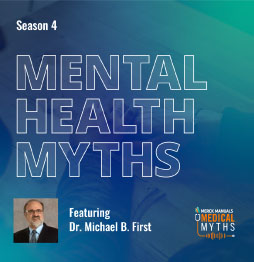- Introduction to Schizophrenia and Related Disorders
- Antipsychotic Drugs
- Brief Psychotic Disorder
- Delusional Disorder
- Other Schizophrenia Spectrum and Psychotic Disorders
- Psychotic Disorder Due to Another Medical Condition
- Schizoaffective Disorder
- Schizophrenia
- Schizophreniform Disorder
- Shared Psychosis
- Substance-/Medication-Induced Psychotic Disorder
Schizophrenia and related psychotic disorders—brief psychotic disorder, delusional disorder, schizoaffective disorder, schizophreniform disorder, and schizotypal personality disorder—are characterized most prominently by psychotic symptoms and often by negative symptoms and cognitive dysfunction.
Psychotic symptoms include delusions, hallucinations, disorganized thinking and speech, and bizarre and inappropriate motor behavior (including catatonia).
Negative symptoms refer to a decrease in or lack of normal emotions and behaviors, such as having a flattened affect and lack of motivation.
Cognitive dysfunction in these disorders affects attention, executive function, and memory.
Diagnosis is based on symptoms and the course of the illness; biologic markers of the disease have not yet been identified, but they are widely sought.

